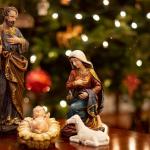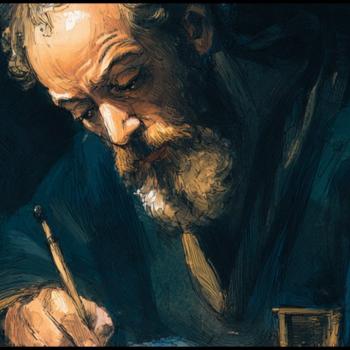
[GUEST POST]
The Incarnation – by which we mean “God coming to dwell with us in the person of Jesus” – is God’s radical act of peacemaking. God subverted every expectation humankind had for what peace would look like; what the Messianic expectation was.
The people of Israel were expecting a warrior King. Someone who would come to save the people through a military victory over their enemies and rule as this righteous warrior King. God subverted their expectation by coming in the form of a vulnerable and dependent infant.
For Christians, peacemaking begins with the body of Christ; with this child Jesus who has subverted every expectation we have for what peace – “shalom” – will look like.
Shalom is this state where “all is well”; where people have access to the food they need, the healthcare they need, the opportunity for just relationships with one another and with God and with the Earth. It’s more than what we think of as “peace”. It’s more than a cease fire. More than a starry night and songs around the campfire. It’s something much more holistic. Much more grand and whole. It’s God’s vision for the Universe as He created it to be. So the work of peacemaking, the practice of peacemaking, really begins there.
God does not come as a warrior king. God comes as a baby. God’s power is hidden under the signs of vulnerability. God comes in poverty. God comes to a young woman who had no status in the community. God’s glory is hidden in the ugliness of our lives. In places of violence, in places of suffering, God is there, hidden among us. This is the theology of the cross. That in the horror of the cross, in the violence, in the ugliness, and the weakness of a man stripped and beaten and hung to die there is something more powerful at work. Hidden under these signs of weakness is the glory of God.
So as Christians we refuse to take up what the world sees as signs of power. We refuse. We don’t always. We fall short in this. But we want to say, “We refuse to be oppressors. We refuse to be dominators. We refuse all of the signs in the world that make for power.” Instead we choose weakness. We choose vulnerability. We choose to love.; to have our hearts broken. We chose this because we know that under those signs, in the manger, among the cattle, on the cross, among the poor, God is there. We are not afraid of being poor. We are not afraid of imprisoned. We are not afraid of standing on the side of those who are weak. We are not afraid to be with God’s little ones. Because there is vulnerability, there is the glory of God. Where there is suffering God’s peace is stronger. No matter how hidden it may seem. In death there is abundant life.
God has already done the radical, the subversive revolutionary act of peacemaking and reconciliation in Christ. God has made peace between Himself and Creation. There’s no bigger gulf than that. There’s no bigger disconnect than between the Divine and the Human. All we have to do is make peace among human beings. God has done the radical thing. We just have to live into that promise.
– Mary Emily Duba
WATCH THE ORIGINAL HERE:
FOR PASTOR’S ONLY: Surviving Pastoral Deconstruction
On Jan. 16 and 17, 2021 we’ll launch Ground Zero: Renew for pastors and former pastors who are deconstructing their Christian faith.
Keith Giles and his wife, Wendy, work with Peace Catalyst International to help build relationships between Christians and Muslims in El Paso, TX. Keith was formerly a licensed and ordained minister who walked away from organized church over a decade ago to start a home fellowship that gave away 100% of the offering to the poor in the community. Today he is the author of the best-selling “Jesus Un” series of books, including “Jesus Unexpected: Ending The End Times To Become The Second Coming” which is available now on Amazon.













